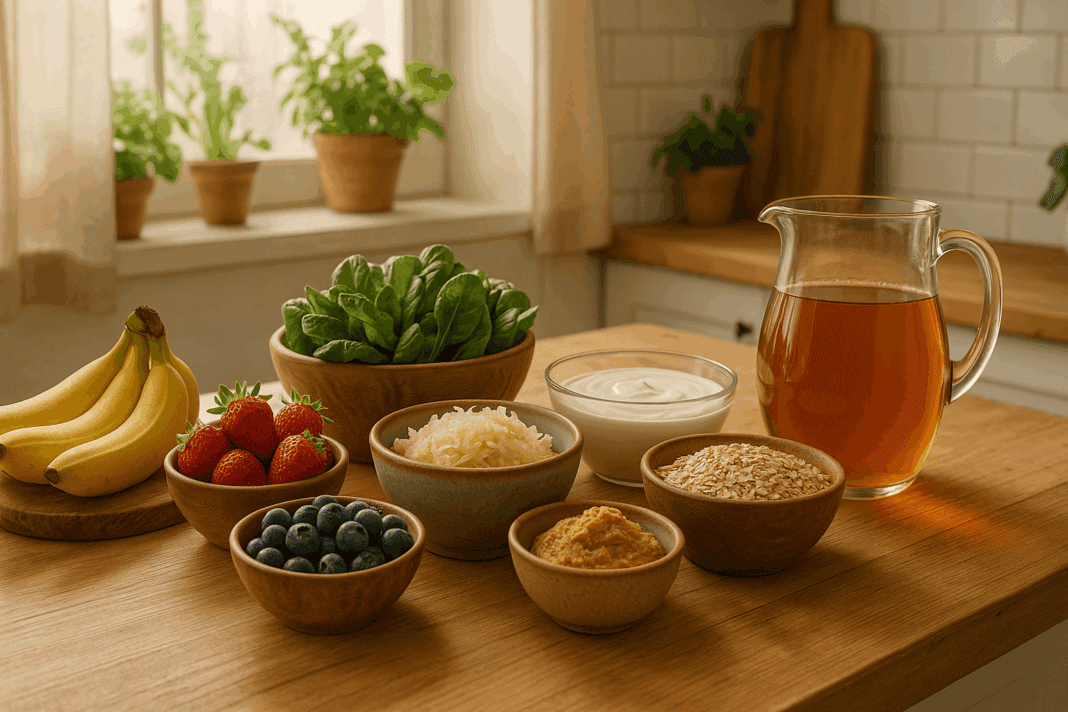Understanding how the foods we consume influence our gut and overall well-being has never been more critical. The concept of holistic health recognizes the profound connection between the gut and the rest of the body, including mental clarity, immunity, and long-term vitality. At the heart of this relationship are dietary foods that help not only nourish our digestive systems but also promote full-body wellness in a sustainable and evidence-based way. With growing interest in gut microbiota, plant-based eating, and functional nutrition, exploring the essential components of a healthy diet becomes both timely and transformative.
You may also like: The Ultimate Guide to Gut Healthy Meals: Best Meals for Gut Health and Nourishing Recipes You’ll Love
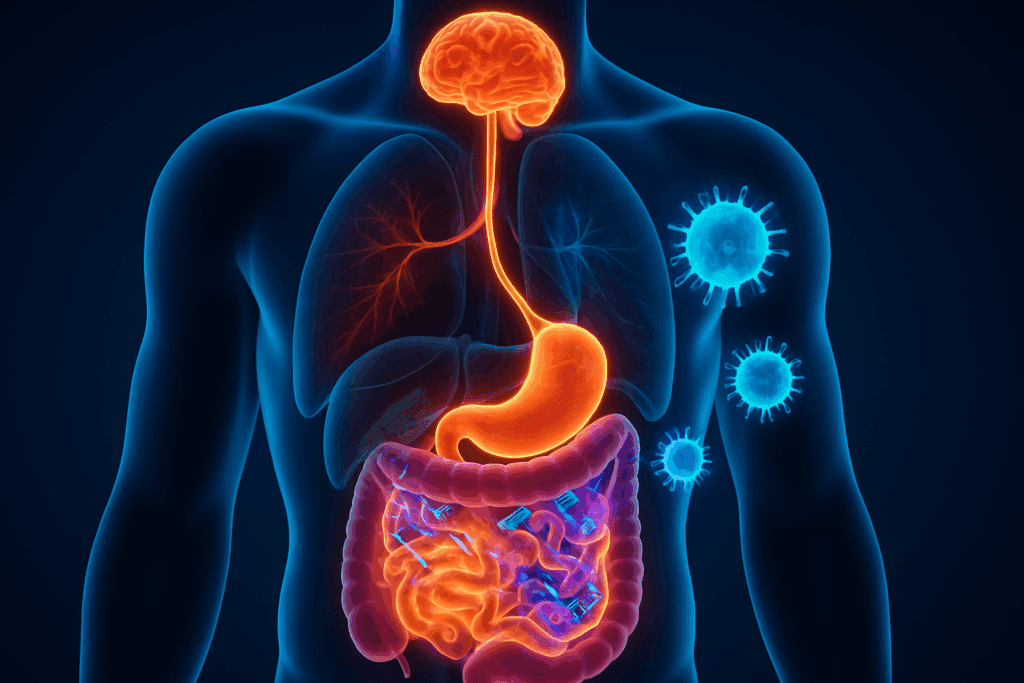
How the Gut Impacts Total Body Wellness
The human gut is home to trillions of microorganisms that collectively form the gut microbiome. This ecosystem plays a central role in digestion, nutrient absorption, immune function, and even emotional health. A balanced microbiome can defend against harmful bacteria, reduce inflammation, and contribute to hormonal and neurological regulation. Conversely, an imbalanced gut can lead to bloating, fatigue, immune dysfunction, and even anxiety or depression. By choosing foods that help fortify this internal environment, individuals can optimize how they feel, function, and recover.
What many refer to as a good diet is essentially one that nurtures this delicate microbial balance. The things healthy diets have in common include fiber-rich vegetables, fermented foods, healthy fats, and minimally processed whole foods. Such a diet encourages diversity among gut bacteria, which is key to resilience and longevity. Eating dietary foods that help improve the microbiome should be part of an integrated strategy for lifelong wellness.
The Microbiome’s Response to Dietary Foods That Help
Every bite we take shapes our internal terrain. The dietary foods that help the microbiome thrive are typically rich in prebiotics and probiotics. Prebiotic foods, such as garlic, onions, leeks, bananas, and asparagus, serve as fuel for beneficial bacteria. Probiotic foods, like kefir, yogurt, miso, and sauerkraut, introduce live microorganisms that populate the gut. Together, these categories of food enhance gut diversity, improve digestive efficiency, and reduce systemic inflammation.
Equally important is understanding what foods have the potential to harm this ecosystem. Diets high in added sugars, refined grains, and artificial additives can diminish microbial diversity and foster an environment where pathogenic bacteria dominate. By contrast, a dietary diet based on whole, plant-forward options can transform the microbiome within just days. Nutritionists agree that consistent consumption of good things to eat—like legumes, leafy greens, nuts, and seeds—helps build long-term intestinal integrity.
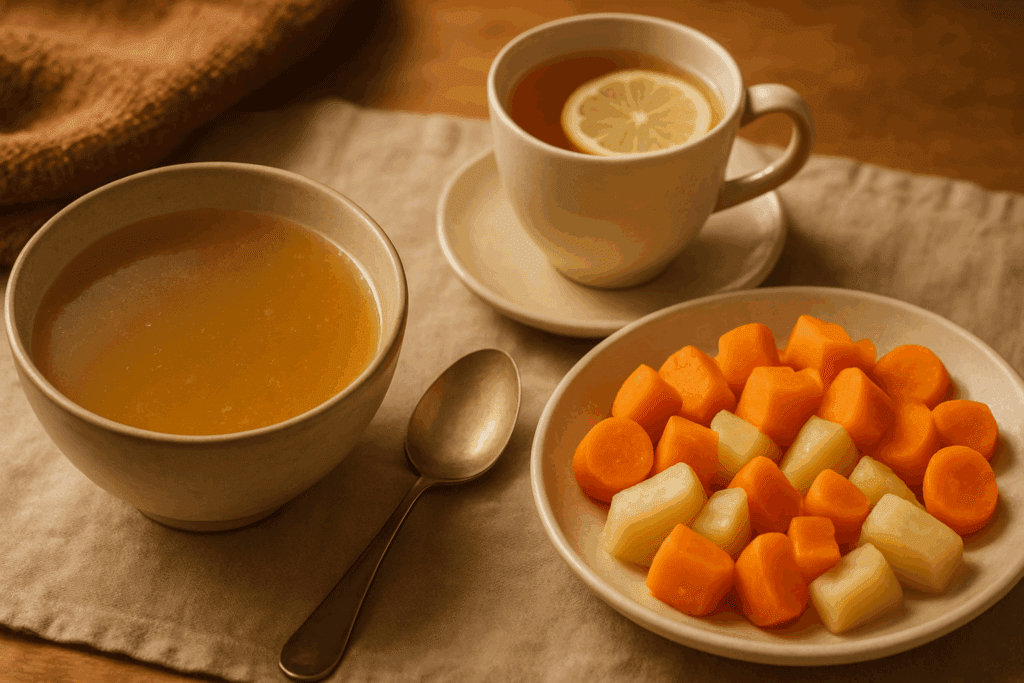
Dietary Foods That Help Restore Balance After Digestive Distress
Digestive distress can be triggered by many factors, including antibiotic use, food poisoning, travel, and chronic stress. In these cases, restoring gut balance becomes essential to regain vitality. Dietary foods that help in recovery must be easy to digest, anti-inflammatory, and rich in restorative compounds. Bone broth, cooked root vegetables, and herbal teas like chamomile or ginger can provide comfort while also supporting mucosal healing.
Fermented foods are especially effective in repopulating beneficial bacteria. Even a food that has been fermented for just a few days can offer millions of beneficial microorganisms. For those with sensitivity to raw or fibrous foods during recovery, lightly cooked or blended options can be gentler. Choosing dietary foods that help during healing phases sets the stage for more advanced nutritional strategies later.
Why Whole Foods Are Key in a Healthy Diet Healthy Enough for Gut Support
The term “whole foods” refers to items that remain close to their natural state, free from synthetic ingredients or significant processing. These include fruits, vegetables, whole grains, lean proteins, and healthy fats. Whole foods embody the essence of a good diet because they offer vitamins, minerals, antioxidants, and fiber in their complete, bioavailable forms. From a gut health perspective, fiber is especially crucial as it serves as both food and scaffolding for gut bacteria.
In fact, one of the things healthy diets have in common is a reliance on whole, plant-based sources of energy. Fiber from oats, lentils, berries, and leafy greens helps regulate bowel movements, bind toxins, and maintain steady blood sugar. Moreover, many whole foods are a food that has symbiotic properties—containing both prebiotic fiber and natural probiotics—such as kombucha with chia seeds or yogurt with flax. Incorporating these dietary foods that help streamline gut function elevates any eating plan from adequate to excellent.
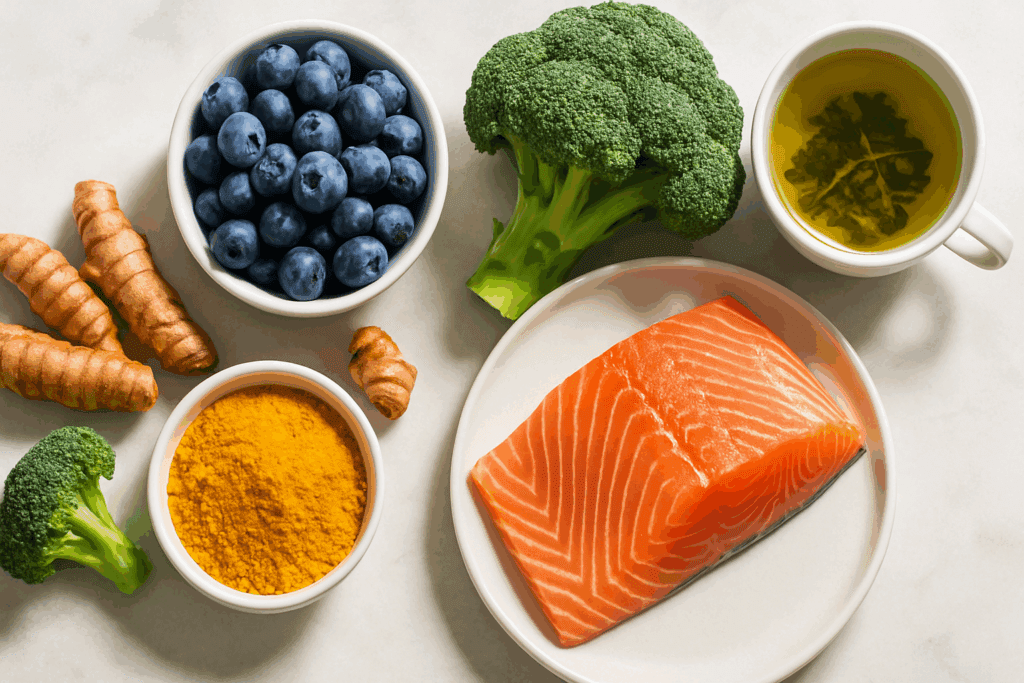
Eating to Heal: Dietary Foods That Help Reduce Gut Inflammation
Chronic inflammation in the gut can manifest as gas, bloating, irritable bowel syndrome (IBS), and even autoimmune flares. Reducing inflammation through nutrition is a science-based strategy that supports not just the gut but also systemic health. Anti-inflammatory dietary foods that help in this process include turmeric, blueberries, fatty fish, and cruciferous vegetables like broccoli and cauliflower.
Omega-3 fatty acids from wild-caught salmon or flaxseed oil help modulate immune responses and soothe inflamed tissues. Polyphenols found in green tea, pomegranates, and cocoa also play a role in protecting the gut lining. These foods that help reduce inflammation are the foundation of any dietary diet aimed at healing. Whether used preventively or therapeutically, they offer tangible relief while being easy to incorporate into daily meals.
Revealing What Foods Have Probiotic Power for Gut Wellness
Fermented foods are gaining popularity not just for their tangy flavors but for their proven health benefits. These foods undergo a process that allows beneficial bacteria to flourish, making them a cornerstone of probiotic nutrition. Yogurt, kefir, kimchi, and miso are examples of what foods have naturally occurring probiotics that can enhance digestive health.
When selecting fermented items, it’s crucial to choose varieties that are unpasteurized and labeled as containing live active cultures. These versions retain their probiotic content and are more effective in colonizing the gut. For individuals avoiding dairy, there are now plant-based versions of these foods, such as coconut milk yogurt and fermented vegetables. Regardless of the source, these are dietary foods that help stabilize gut flora and boost immune function over time.
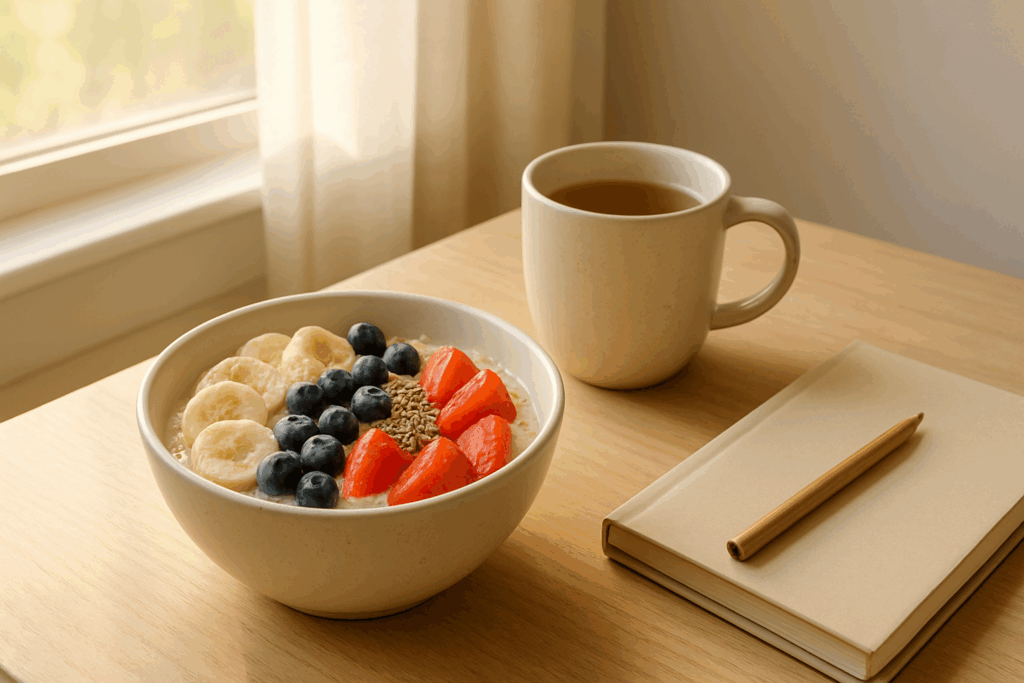
Exploring What’s Good for a Daily Gut-Healthy Routine
Establishing a consistent dietary rhythm is one of the most powerful ways to support gut health. What’s good for the microbiome is often simple and repeatable: starting the day with a fiber-rich breakfast, staying hydrated with herbal teas, and avoiding late-night heavy meals. Many experts suggest incorporating small servings of fermented foods daily, as well as consuming a diverse array of plant-based options throughout the week.
Hydration plays a silent but essential role in gut health. Water, herbal teas, and mineral broths help transport nutrients and keep the bowel lining moist and functional. Spacing meals properly, chewing thoroughly, and eating mindfully also contribute to digestive ease. Incorporating these good things to eat into a routine doesn’t require perfection but rather commitment to consistency.
A Closer Look at Dietary Foods That Help During High-Stress Periods
Stress and digestion are inextricably linked through the gut-brain axis. During high-stress periods, the body may divert resources away from digestion, leading to discomfort or even temporary food sensitivities. Dietary foods that help during these times often include magnesium-rich options such as spinach, pumpkin seeds, and dark chocolate, which support nervous system relaxation.
Adaptogenic herbs like ashwagandha and rhodiola can be included through supplements or brewed teas to help modulate stress responses. Complex carbohydrates like quinoa and oats promote serotonin production, which can buffer stress’s emotional toll. In times of high demand, reaching for nutrient-dense, easily digestible diet food is one of the best ways to maintain balance and reduce the risk of gastrointestinal flare-ups.

Identifying the Core of a Good Diet for Long-Term Gut Support
A truly good diet isn’t defined by temporary trends or extreme restrictions but by sustainability and variety. A pattern that includes a full spectrum of macronutrients, ample fiber, moderate fermented food intake, and seasonal fruits and vegetables is ideal for supporting gut integrity. Importantly, the things healthy diets have in common include flexibility and personalization.
Listening to one’s body, adjusting to energy needs, and accommodating food preferences ensures that a healthy diet remains a lifelong habit rather than a temporary fix. Dietary foods that help support gut health are best seen not as isolated items but as part of an overall lifestyle. When combined with exercise, sleep hygiene, and mental wellness, these foods become foundational to vitality.
Dietary Foods That Help During Aging and Life Transitions
As people age, their digestive capabilities shift. There may be changes in enzyme production, stomach acid levels, or even gut flora diversity. Older adults often experience slower motility, which can lead to constipation or nutrient malabsorption. To combat these challenges, certain dietary foods that help include prunes, psyllium husk, yogurt, and papaya, which contain enzymes that aid digestion.
Women in midlife may experience gut shifts during menopause due to hormonal changes. Flaxseeds, fermented soy, and leafy greens can provide phytoestrogens and micronutrients that support both hormonal and digestive balance. Similarly, individuals recovering from illness or surgery benefit from bone broths, pureed soups, and high-protein soft foods. Choosing the right diet food during transitional times is a powerful way to maintain equilibrium and resilience.
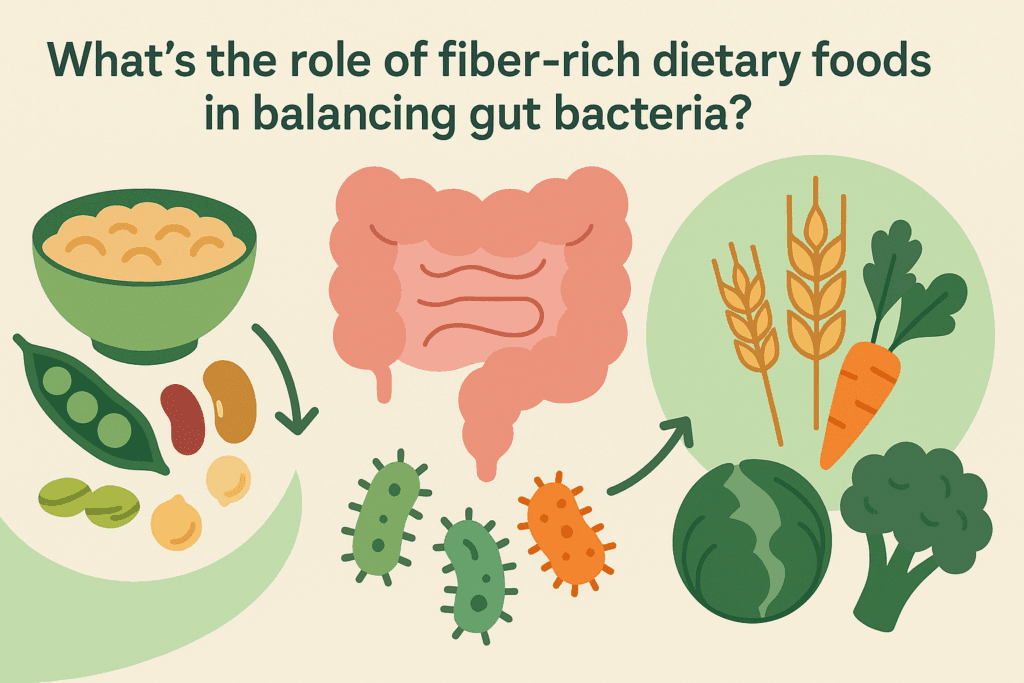
Spotlighting Dietary Foods That Help as Functional Medicine Tools
Functional medicine practitioners emphasize root-cause healing through personalized nutrition. They often begin with a detailed analysis of symptoms, labs, and history to craft a dietary strategy that targets inflammation, dysbiosis, or nutrient deficiencies. Among the most common recommendations are dietary foods that help restore microbial balance, reduce bloating, and improve absorption.
Foods like fermented beets, medicinal mushrooms, and sprouted legumes are often suggested due to their high nutrient density and compatibility with various conditions. Such foods go beyond mere sustenance—they are therapeutic agents. By viewing dietary intake as both preventive and curative, individuals can make food choices that align with both holistic and evidence-based frameworks.
Eat Healthy to Be Healthy: The Long-Term Rewards of Gut-Conscious Nutrition
The mantra “eat healthy to be healthy” finds its deepest expression in gut health. When digestion works efficiently, the body can extract and assimilate nutrients with ease, supporting brain function, skin clarity, and energy levels. Long-term adherence to a nutrient-dense, fiber-rich, and minimally processed diet rewires the body for resilience.
Such a dietary diet is not built overnight. It evolves through trial and error, attention to how foods feel, and a growing appreciation for real nourishment. The benefits extend far beyond the gastrointestinal tract, influencing inflammation, sleep quality, hormonal balance, and even immunity. Eating to support the gut is one of the most effective ways to pursue vibrant, whole-body wellness.
Frequently Asked Questions (FAQ) on Dietary Foods That Help Support Gut Health and Holistic Wellness
How do dietary foods that help influence mental clarity and emotional balance?
Emerging research highlights the profound connection between gut health and mental wellness, often referred to as the gut-brain axis. Dietary foods that help nourish gut bacteria can indirectly influence neurotransmitter production, particularly serotonin, which is largely synthesized in the gut. For instance, fermented foods and high-fiber vegetables promote microbial diversity, which in turn supports a stable mood and cognitive function. Incorporating good things to eat like lentils, sweet potatoes, and probiotic-rich kefir may help buffer stress responses and improve concentration. While these foods are not a substitute for psychological care, they serve as part of a holistic strategy to maintain mental clarity and emotional equilibrium.
Can I use dietary foods that help to improve energy levels throughout the day?
Yes, gut-supportive foods can significantly influence energy levels by enhancing nutrient absorption and stabilizing blood sugar. A dietary diet that includes oats, quinoa, legumes, and bananas supplies slow-releasing carbohydrates that prevent energy crashes. A food that has magnesium or iron, such as spinach or pumpkin seeds, supports cellular metabolism, which is vital for sustained energy. Additionally, fermented foods like kimchi and yogurt improve digestion, allowing your body to efficiently convert food into usable fuel. Unlike energy drinks or quick fixes, this nutritional approach aligns with a healthy diet that sustains vitality over the long term.
What’s good for gut health in terms of hydration and beverage choices?
While most people focus solely on solid food, hydration is a critical but often overlooked aspect of gut health. Herbal teas, particularly ginger, peppermint, and chamomile, soothe the gut lining and promote digestive motility. A healthy diet healthy in fiber also demands higher water intake to facilitate smooth digestion and nutrient transit. Mineral-rich broths and water infused with citrus or cucumber can provide electrolytes, which support cellular hydration. Even beverages like kombucha—a fermented tea—qualify as dietary foods that help maintain microbial balance while hydrating the body.
Are there seasonal variations in foods that help support gut wellness?
Yes, eating seasonally enhances the diversity and nutritional value of your meals, which is one of the things healthy diets have in common. Spring offers leafy greens and radishes rich in antioxidants, while summer brings berries and tomatoes full of polyphenols. In autumn, squash and apples deliver soluble fiber that supports a healthy microbiome. Winter foods like fermented cabbage and root vegetables nourish digestion when raw produce may be harder to access. By rotating your diet food choices according to the seasons, you introduce new strains of beneficial bacteria and a broader range of nutrients that benefit both your gut and overall immunity.
How can dietary foods that help be used to reduce dependence on supplements?
While supplements can play a role in certain health protocols, relying on whole foods often ensures better bioavailability and fewer side effects. For example, dietary foods that help restore gut health naturally contain compounds like resistant starch, which are not always available in isolated form. Eating foods that help repair the gut lining, such as bone broth or aloe vera juice, provides a complex matrix of nutrients that work synergistically. Whole foods also carry cofactors that aid in nutrient absorption—a feature lacking in many synthetic pills. Integrating a good diet built on food-based sources of vitamins and minerals may reduce the need for long-term supplementation.
Can a dietary diet support gut health during travel or schedule disruptions?
Absolutely, maintaining gut wellness during travel is possible with a few proactive strategies. Portable options like chia seeds, dried fruit, and high-fiber crackers are easy to pack and support digestive regularity. Probiotic capsules and shelf-stable fermented foods, such as miso packets, help maintain microbial diversity on the go. A healthy diet rich in prebiotics can continue even while traveling if one seeks out options like bananas, oats, or cooked legumes. Choosing simple dietary foods that help reduce transit-induced bloating or constipation allows your digestive system to stay balanced despite disruptions.
How do cultural food practices align with dietary foods that help gut health?
Many traditional cuisines have long included foods that promote gut health, even before scientific terminology existed to explain their benefits. Korean kimchi, Indian lassi, German sauerkraut, and Japanese miso are all examples of dietary foods that help support microbial balance and digestion. A food that has been fermented often carries both cultural significance and probiotic power. Adapting these global culinary practices into a modern healthy diet enhances variety and adds richness to your meals. Appreciating how these traditions contribute to a good diet also supports sustainability and cross-cultural wellness insights.
What’s the role of fiber-rich dietary foods in balancing gut bacteria?
Fiber acts as a prebiotic, feeding the good bacteria in your gut and promoting their growth. Soluble fibers, found in oats, legumes, and citrus fruits, form a gel-like substance that slows digestion and supports blood sugar control. Insoluble fibers in whole grains and cruciferous vegetables help add bulk to stool and speed up transit time. Incorporating both types into a dietary diet ensures a more comprehensive approach to digestive health. Because what foods have fiber can differ seasonally and culturally, rotating sources enhances microbial diversity and reduces digestive stagnation.
How can dietary foods that help address food sensitivities or intolerances?
Food sensitivities can often be managed by improving gut health, which in turn reduces systemic inflammation. Incorporating dietary foods that help repair the intestinal lining, such as collagen, glutamine-rich foods, and fermented vegetables, can build resilience against reactive symptoms. Rotating foods and choosing a variety of good things to eat lowers the risk of overexposure to specific allergens. Additionally, eliminating ultra-processed items and focusing on whole, unprocessed options makes it easier to identify trigger foods. While not a cure-all, a personalized dietary strategy can significantly reduce sensitivity severity over time.
How do social habits affect your ability to maintain a good diet for gut health?
Social settings often influence food choices, and peer pressure or convenience can lead to deviations from a dietary diet focused on wellness. To counteract this, individuals can adopt practical strategies such as bringing a gut-friendly dish to gatherings or eating a stabilizing meal beforehand. Understanding what’s good for your digestive health enables informed decision-making even in less-than-ideal environments. Establishing non-food-based social rituals, such as walking or yoga meetups, can also reinforce habits that align with a healthy diet healthy enough to sustain gut wellness. Over time, social alignment with wellness goals creates an empowering loop that supports long-term health.
Conclusion: The Lasting Power of Dietary Foods That Help Cultivate Gut Health and Holistic Wellness
As we have explored, dietary foods that help nourish the gut are foundational to achieving holistic health. They influence every major system in the body, from immune function to mood regulation and cellular repair. By selecting whole, fiber-rich, probiotic, and anti-inflammatory foods, individuals empower themselves to take charge of their well-being in a sustainable, evidence-based way.
Whether one is starting fresh or refining an existing routine, the focus should be on consistency, variety, and personalization. The good diet is not one-size-fits-all but one that adapts to unique needs, preferences, and life stages. Embracing a healthy diet healthy enough to nurture the gut means embracing long-term vitality. With every bite of dietary foods that help, we are writing the story of our future health—one meal at a time.

